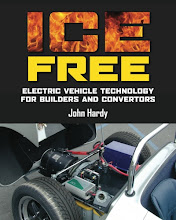There has been some discussion at work about greening the workplace. There are lots of politically correct things to do like recycling paper and ink cartridges and using low-power laptops. Most of these things pale into insignificance however when compared with the impact of commuting to the workplace.
As a ball-park figure, a car needs about 1 Kilowatt-hour to go 5 miles. Even ignoring engine and drivetrain efficiency (lousy, especially for the first part of the journey in winter when the engine is cold), this still works out to a Megawatt-hour per day for 250 people doing 10 miles each way. There are several possible ways to reduce this.
- Encourage home working, maybe following BT's lead and having people formally based at home and hot desking when they come into the office for meetings.
- Apply pressure for better public transport links (minibuses to business parks from park-and-ride locations??)
- Encourage care sharing/pooling
- State a policy to provide electric vehicle charging points at work. Many of us could commute in currently-available electric vehicles if there was recharging at work.
- a greater range of energy sources other than oil (including renewables)
- greater thermal efficiency (a fixed power station is more efficient than the true lifetime efficiency of a car engine which some sources put below 5%)
- more efficient distribution (electricity is distributed by wires with a small loss compared with the additional fuel burn of petrol tankers)
- less atmospheric pollution (fixed power stations again)
Electric and plug-in hybrid vehicles have a further longer term emergent eco-system benefit. With the right control software a critical mass of electric vehicles nationally could be used to smooth power demand. At present a significant amount of generating capacity has to be kept on idle standby to cope with peaks and troughs in demand (e.g. everyone putting the kettle on at the start of cup-final half time). A million EV batteries could do the same job (the grid charges the batteries during play and borrows a bit back at half time)

No comments:
Post a Comment